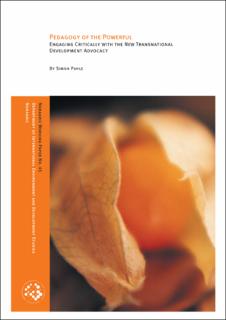| dc.contributor.author | Pahle, Simon | |
| dc.date.accessioned | 2020-09-30T12:33:29Z | |
| dc.date.available | 2020-09-30T12:33:29Z | |
| dc.date.issued | 2008-08 | |
| dc.identifier.issn | 0809-4934 | |
| dc.identifier.uri | https://hdl.handle.net/11250/2680557 | |
| dc.description.abstract | Arguably, major obstacles to poverty reduction, dignity and security for the world’s poor and oppressed sit in the Global North; in the way through which Northern governments, corporations and – ultimately – citizenries perpetuate wealth inequalities and power asymmetries across borders. This paper argues that the broader recognition of such structural obstacles to development has been accompanied by the rise of what is here labeled a Pedagogy of the Powerful – a momentous emergence of a broad range of transnational advocacy efforts seeking to promote development by way of targeting decisions made in the Global North.
The first part of the paper proposes a delimitation of the Pedagogy of the Powerful as a field of study. Key analytical concepts are borrowed from Robert Chambers, and the political ascendancy of the subject matter is associated with three formative transnational campaigns: The International Baby Foods Action Network vs. Nestlé; the International Campaign to Ban Landmines; and The Debt Relief Movement. The second part suggests some political circumstances that may be seen to have provoked and facilitated the rise of the Pedagogy of the Powerful.
The remainder seeks to contribute some analytical perspectives as to how students of development may engage themselves critically with these increasingly visible kinds of development interventions: The third part suggests that such interventions draw on four qualitatively different (but compatible) pedagogies, each with strengths and weaknesses that need to be carefully appraised. The fourth part distinguishes three types of legitimacy claims on which Pedagogy of the Powerful interventions typically rely. And just as with the different pedagogies, legitimacy claims present the pedagogues with thorny dilemmas, and ought to be subject to critical appraisal. | en_US |
| dc.language.iso | eng | en_US |
| dc.publisher | Norwegian University of Life Sciences, Ås | en_US |
| dc.relation.ispartofseries | Noragric Working Papers;45 | |
| dc.title | Pedagogy of the Powerful: Engaging Critically with The New Transnational Development Advocacy | en_US |
| dc.type | Working paper | en_US |
| dc.subject.nsi | VDP::Social science: 200 | en_US |
| dc.source.pagenumber | 48 | en_US |
